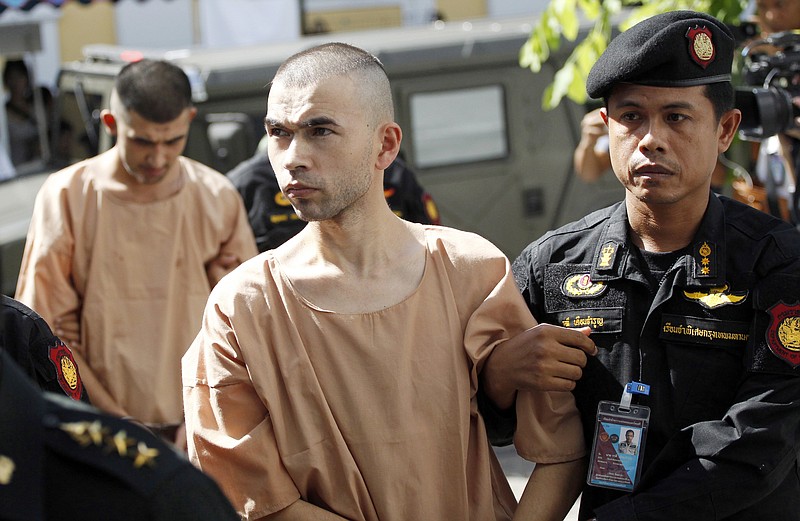BANGKOK (AP) - A Thai military court on Tuesday began the trial of two foreigners charged with the bombing of a popular shrine in Bangkok's center a year ago that killed 20 people and injured more than 120.
The defendants - two ethnic Uighurs of Chinese nationality - were driven straight into the military court building, preventing reporters from approaching them.
The bombing on Aug. 17, 2015, was one of the deadliest acts of violence in Thailand in decades. It went off at the Erawan shrine, popular among Chinese and other tourists, in the center of Bangkok. Of the dead, 14 were tourists.
The two men - Mieraili Yusufu and Bilal Mohammad, also known as Adem Karadag - have pleaded not guilty, and at a recent pre-trial appearance they broke down in tears alleging mistreatment by Thai authorities. They are the only two men in custody out of the 17 people that authorities say were responsible.
"Today is the first day for witness testimony ... I think it (the trial) will last until next year. It will take quite some time," said Chuchart Kanpai, the lawyer for one of the defendants.
Thai authorities have said the bombing was revenge by a people-smuggling gang whose activities were disrupted by a crackdown. However, some analysts suspected it might have been the work of Uighur separatists angry that Thailand in July had forcibly repatriated scores of Uighurs to China, where they may be persecuted.
The Erawan Shrine is especially popular among Chinese tourists, and many were among the victims of the bombing.
Chuchart has told reporters in the past that Bilal had been tortured to admit that he was the person seen in surveillance video planting the bomb. Bilal says his captors poured cold water into his nose, threatened to send him back to China and had a barking dog frighten him.
Police say the case against the two men is supported by closed-circuit television footage, witnesses, DNA matching and physical evidence, in addition to their confessions. Police believe Yusufu detonated the bomb minutes after a backpack containing the device was left at the shrine by Bilal.
Since a May 2014 coup installed the military in power, its courts in Thailand have handed criminal cases deemed to involve national security.
The two men have been held at an army base since their arrest in late August and early September 2015. No other details of their interrogation have been revealed. Some of the 15 other suspects are Turks, with whom Uighurs share ethnic bonds, and Turkey is home to a large Uighur community. Beijing charges that some Uighurs are Islamist terrorists and that some have been smuggled out of China to join Islamic State fighters in Syria via Turkey.
